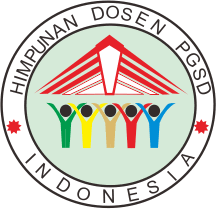Upaya meningkatkan motivasi dan hasil belajar IPA dengan pemanfaatan metode pembelajaran kooperatif tipe STAD (Student Team Achievement Division) tentang materi larutan asam, basa dan garam siswa kelas VII
Abstract
The purpose of this class action research is to, describe STAD type cooperative learning in learning science about the structure of acidic, basic and salt solutions in increasing student motivation. Describe STAD type cooperative learning in science learning about the structure of acid, base and salt solutions in increasing student motivation and learning outcomes. This research was conducted in 3 cycles. The subjects of this study were grade VII of SMP Negeri 1 Pagentan, Banjarnegara Regency in the academic year 2019/2020 with 18 boys and 19 girls. The data analysis technique used was descriptive qualitative analysis and continued reflection. The results of the study show that: (1) The application of STAD cooperative learning has been able to increase learning motivation and level of mastery learning for Grade VII students of SMP Negeri 1 Pagentan, Banjarnegara Regency (2) The application of STAD cooperative learning to increase student motivation and learning achievement in Science subject matter Natural knowledge in the material solutions of acids, bases and salts is also characterized by increased cooperation and student activity in teams (groups) and students' presentations of the results of teamwork shown in the increase in the value of observation.
Keywords
Full Text:
PDFReferences
Dimyati dan Mujiono. (2002). Belajar dan Pembelajaran. Jakarta. Rineka Cipta
Hamzah. B. Uno. (2013). Teori Motivasi dan Pengukurannya. Jakarta: Bumi Aksara.
Arifin, Zainal. (1990). Evaluasi Instruksional Prinsip-Teknik-Prosedur. Bandung :Remaja Rosdakarya.
Jamil Suprihatiningrum. (2013). Strategi Pembelajaran, Teori & Aplikasi. Yogyakarta: Penerbit Ar-Ruzz Media.
Mulyasa, E. (2012). Kurikulum Tingkat Satuan Pendidikan. Bandung: PT.Remaja Rosdakarya
Slavin,R.E. (2010) . Cooperative Learning. Terjemahan Narulita Yusron. Bandung : Nusa Media
Suprijono, A. (2013).Cooperative learning Teori dan Aplikasi PAIKEM. Yogyakarta: Pustaka Pelajar.
Isjoni. (2012). Pembelajaran Kooperatif (Meningkatkan Kecerdasan Komunikasi Antar Peserta Didik). Yogyakarta : Pustaka Pelajar.
Trianto. (2007). Model-Model Pembelajaran Inovatif Berorientasi Konstruktivistik. Jakarta: Prestasi Pustaka Publisher.
Suherman, E, Turmudi, Suryadi, D, Herman, dkk. (2003). Strategi Pembelajaran Matematika Kontemporer (Edisi Revisi). Bandung : Universitas Pendidikan Indonesia.
Nurhadi, dkk. 2003. Pembelajaran Kontektual (Contextual Teaching and Learning (CTL)) dan penerapan dalam KBK. Malang : Universitas Negeri Malang.
Setiawati, Lilis.(2010) Strategi Pembelajaran. Jakarta: Universitas Terbuka.
Michael M Van Wyk. (2012). The Effects of the STAD-Cooperative Learning Method on Student Achievement, Attitude and Motivation in Economics Education. Journal of Social Sciences.vol 33, 261-270.
Dhewani, M. A., Yamtinah, S., & Martini, K. S. (2015). Penerapan Model Pembelajaran Stad (Student Teams Achievement Division) Dilengkapi Dengan Lks Untuk Meningkatkan Motivasi Dan Prestasi Belajar Pada Materi Reaksi Kimia Siswa Kelas Vii Smp Negeri 19 Surakarta. Jurnal Pendidikan Kimia (JPK), 4(1), 137–143.
Gusniar. (2013). Penerapan Model Pembelajaran Kooperatif Tipe Student Teams Achievment Division (STAD) Dalam Meningkatkan Hasil Belajar Siswa Pada Mata Pelajaran IPS Kelas IV SDN No. 2 Ogoamas II. Jurnal Kreatif Tadulako Online, 2(1), 198–221. http://jurnal.untad.ac.id/jurnal/index.php/JKTO/article/viewFile/3005/2081
Purnanigtyas, Erni. (2010). Implementasi Kurikulum Berbasis Kompetensi 1. Bandung: Bina Media Informasi.
Refbacks
- There are currently no refbacks.



